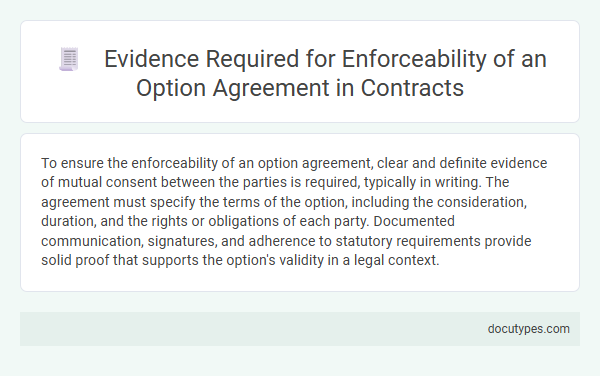To ensure the enforceability of an option agreement, clear and definite evidence of mutual consent between the parties is required, typically in writing. The agreement must specify the terms of the option, including the consideration, duration, and the rights or obligations of each party. Documented communication, signatures, and adherence to statutory requirements provide solid proof that supports the option's validity in a legal context.
Definition of an Option Agreement
What is the definition of an option agreement in contract law? An option agreement is a contract that grants one party the exclusive right to buy or sell an asset at a predetermined price within a specified period. This agreement secures the option holder's ability to make a decision without immediate obligation.
Legal Basis for Enforceability
Enforceability of an option agreement depends on clear legal evidence demonstrating mutual consent and consideration. Courts require concrete proof to uphold the binding nature of such agreements.
- Written Agreement - A signed document outlining the option terms provides the strongest evidence of enforceability.
- Consideration - Proof of payment or something of value exchanged secures the option's validity under contract law.
- Clear Offer and Acceptance - Demonstrable mutual assent through communication ensures binding intent between parties.
Key Elements Required in an Option Agreement
Key elements required for the enforceability of an option agreement include a clear offer, specified consideration, and a definite time frame. The agreement must outline the option holder's right to purchase or lease property under agreed terms.
Evidence must demonstrate mutual assent, supported by signed documentation reflecting the terms. Courts require clarity on price, duration, and obligations to uphold the option's validity.
Importance of Clear Offer and Acceptance
Clear offer and acceptance are crucial for the enforceability of an option agreement. The terms must be explicitly stated to avoid any ambiguity in the contract.
The offer should detail the specific rights granted, including the option period and conditions. Acceptance must be unequivocal and communicated within the designated timeframe. Courts rely on these clear exchanges to validate the option agreement.
Requirement of Consideration in Option Contracts
| Requirement of Consideration in Option Contracts | |
|---|---|
| Definition of Consideration | Consideration is a legal requirement wherein something of value is exchanged between parties. In option agreements, it ensures the promise to keep the offer open is binding. |
| Role in Enforceability | An option contract remains enforceable only if valid consideration supports it. Without consideration, the option may be deemed an unenforceable gift rather than a binding agreement. |
| Types of Consideration | Consideration may be monetary payment, services, or a promise to refrain from an action. Your payment or exchange of value solidifies the option's binding nature. |
| Legal Precedents | Courts consistently hold that consideration is essential for enforcing option contracts. Past rulings clarify that nominal consideration suffices if it demonstrates intent to create legal obligations. |
| Practical Insight | To ensure enforceability, documentation of consideration must be clear and present in the option agreement's terms. This protects your rights and confirms the contract's validity. |
Written Evidence versus Oral Agreements
Enforceability of an option agreement primarily depends on clear evidence of the terms agreed upon by the parties. Written evidence, such as a signed contract, provides definitive proof and is generally preferred by courts to avoid disputes. Oral agreements may be enforceable if corroborated by credible witnesses or actions, but they carry a higher risk of ambiguity and challenge in legal settings.
Role of Specific Terms and Conditions
The enforceability of an option agreement depends heavily on the presence of clear, specific terms and conditions. These elements provide concrete evidence to support the parties' intentions and obligations.
- Precision of Terms - Specific terms outline the rights and duties of both parties, reducing ambiguity that could invalidate the agreement.
- Defined Option Period - A clearly stated time frame for exercising the option is essential to establish enforceability and avoid disputes.
- Consideration Clause - The inclusion of consideration demonstrates mutual consent and is a critical element for contractual binding.
Courts rely on detailed documentation of terms and conditions to verify the validity and enforceability of option agreements.
Proof of Mutual Intent and Consent
To establish the enforceability of an option agreement, clear proof of mutual intent and consent is essential. Both parties must demonstrate a shared understanding and agreement on the terms and conditions.
Evidence may include written contracts, signed documents, or recorded communications confirming consent. Your ability to present this proof ensures the option agreement holds legal weight and can be enforced in court.
Documentation and Recordkeeping Best Practices
Proper documentation is crucial for the enforceability of an option agreement, ensuring all terms and conditions are clearly outlined and signed by involved parties. Maintaining detailed records such as written contracts, correspondence, and amendments protects against disputes and provides legal proof of the agreement. Implementing systematic recordkeeping best practices, including secure storage and easy retrieval, supports compliance and enforces the agreement effectively.
What Evidence Is Required for the Enforceability of an Option Agreement? Infographic

